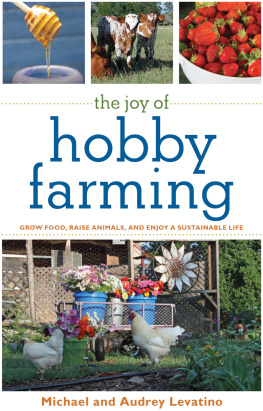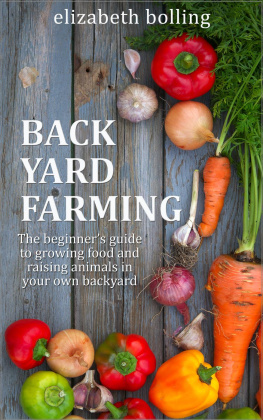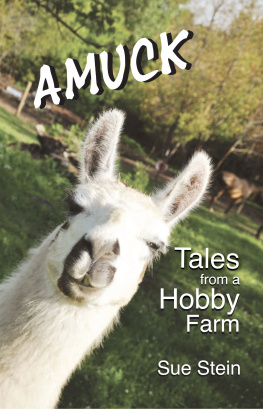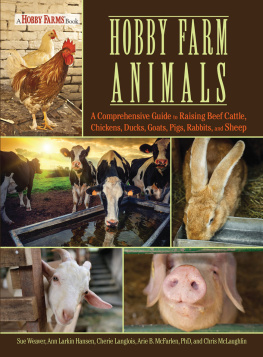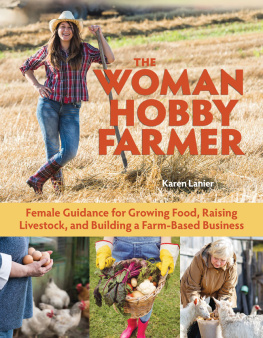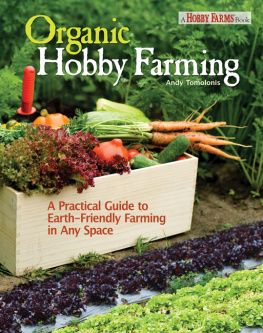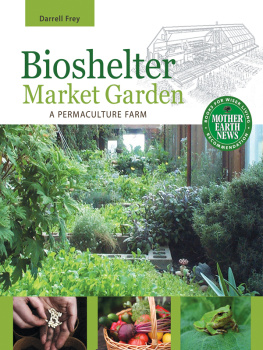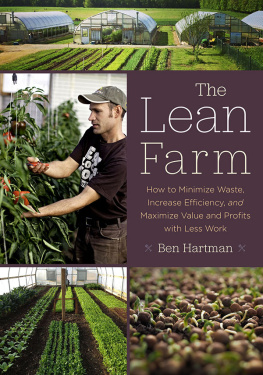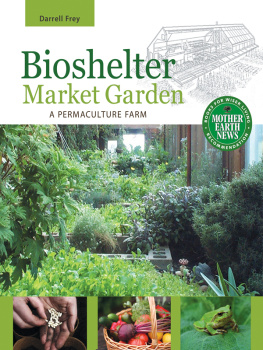hobby
farming
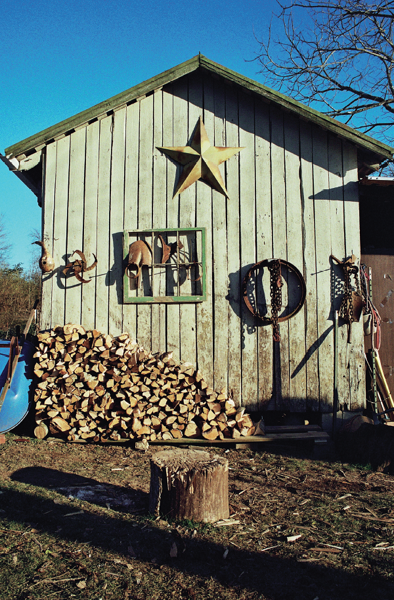
hobby
farming
GROW FOOD, RAISE ANIMALS, AND
ENJOY A SUSTAINABLE LIFE
Michael and Audrey Levatino

Copyright 2011 by Michael and Audrey Levatino
All photography by Michael Levatino, except images on pages 89, 94, 97, 121, 132 by Shutterstock, and image on page 105 by Bill Vinett.
All Rights Reserved. No part of this book may be reproduced in any manner without the express written consent of the publisher, except in the case of brief excerpts in critical reviews or articles. All inquiries should be addressed to Skyhorse Publishing, 307 West 36th Street, 11th Floor, New York, NY 10018.
Skyhorse Publishing books may be purchased in bulk at special discounts for sales promotion, corporate gifts, fund-raising, or educational purposes. Special editions can also be created to specifications. For details, contact the Special Sales Department, Skyhorse Publishing, 307 West 36th Street, 11th Floor, New York, NY 10018 or info@skyhorsepublishing.com.
www.skyhorsepublishing.com
10 9 8 7 6 5 4 3 2 1
Library of Congress Cataloging-in-Publication Data is available on file.
ISBN: 978-1-61608-228-4
Printed in China
For Tippy and Oswald
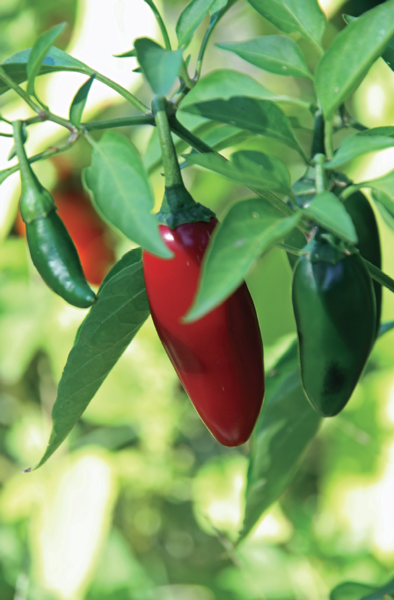
Contents
Place
Growing Things
The Care of Living Creatures
9. SMALL CREATURES FOR THE HOBBY FARM
Running Your Farm as a Business
Preface
Imagine any sunny summer afternoon. Chances are, my wife Audrey and I have spent the day at the farmer's market, selling our selection of cut flowers, vegetables, jewelry, eggs, and honey. We wake up early, before the sun is up, to load the car under the lights of our shed. At the market, we set up our canopy and create our multi-level display on tables and wooden crates covered with tablecloths. We hang our farm banner, write the day's offerings on our white board, and design some flower bouquets in vases as we wait for the customers. The hours fly by as we sell our wares and there's rarely a moment to sit and rest.
After noon, when the market is shut down and we count our moderate sales, we again pack up the car with a (hopefully) much lighter load. Back at the farm, we spend an hour or so cleaning out our flower buckets, storing the leftover flowers in the cooler, and putting away our supplies. The profit for our time doesn't quite add up, but with my real job kicking back in on Monday morning, we can certainly justify a pleasant nap. We've learned that when it comes to hobby farming, we need to use the term profits looselythe pleasures of an afternoon enjoying the land or our friends at the farmer's market easily evens out the costs of the work.
We weren't looking for a farm when we decided to move to Virginia. We'd been living in the Bay Area, where we'd relocated from Colorado during the height of the Internet boom years. We moved from the peace of the mountains to a frenetic, pulsing area of new wealth and utopian values. We both had new jobs, mine as a travelling book salesman and Audrey as a high school teacher in Silicon Valley.
We were young and we worked hard during those three years in Oakland. The traffic was hellish and Audrey commuted to work two hours each way. Every day was different for me as I fought the traffic to bookstores all over Northern California up to Washington State, sometimes being away from home for a couple of weeks at a time. But we settled into our one-bedroom apartment on the top floor of an art deco house. We immersed ourselves in the local food and music scene. We took on the local values by recycling (those were the days when not everyone did), forgoing meat and supporting animal rights. We became Bay Area denizens.
But we longed for our own home and were tired of paying a king's ransom for the rent on our tiny apartment. So when a sales territory at my company opened up in the mid-Atlantic region of the country, we jumped at it. And the search began. We wanted a starter home with at least a couple of acres of land for a garden and a dog.
After many weeks of searching, our farm found us: Bring your animals. Two-bedroom house in the country on twenty-three acres. Fenced for horses. We'd never dreamed of owning a farm. But we suddenly realized that we now had the opportunity to put all our ideals into practice. We'd been eating local foods, but not growing them. We'd cared for one cat; now we could adopt many more animals. We'd donated to environmental organizations to protect land from development; now we had a golden opportunity to protect 23 acres of our own. We could become responsible producers instead of just responsible consumers.
As you'll read in these pages, we went for it. But we couldn't have done it without an off-farm job. I travel to the city once a month to check in with my company, doing the rest of my work as an account manager for a large publishing house from home or the road. Without my off-farm income, there would be no farm to call our own. And while the farm provides the cut flowers, vegetables, eggs, and honey we produce, it's also a healthy outlet at the end of a hectic sales week. It stretches muscles, both physical and mental, that become cramped from office work and travel. It's a lifestyle that provides balance.
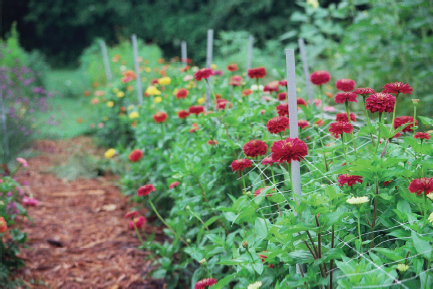
PART
Place
The view of our farm
in fall from the other
side of the pond.
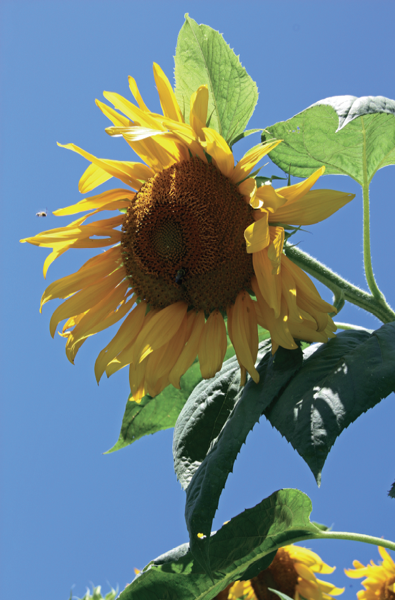
CHAPTER 1
Introduction
The best piece of advice we got when embarking on our hobby farm was, Start small and don't overwhelm yourself. There are countless stories of folks who move to the country, buy a flock of sheep and several horses, order a bunch of chickens, and start an organic garden, only to exhaust their economic and physical resources. It's much easier to start small and grow into your comfort level than to go all in and try to keep up. This is the key benefit of hobby farming. Since you aren't pressured to make it profitable right away, you have room to explore and grow into your farm.
Why Hobby Farming?
To hobby farm is to enjoy the bounty of your land without making economic demands on it (or yourself) that would degrade its natural sustainability. The ethos of hobby farming is living close to the land, protecting it from development and overproduction, savoring the bounty of what can be produced on it by your hands alone, and sharing the fruits of your labors with nearby friends and strangers.
Contributing to your local economy is also important. It's now accepted wisdom that our country is moving away from factory-farmed, chemical-laden foods and more toward locally grown, organic foods. If there's to be diversity at all in the offerings at your local farmer's market, a necessity if local farmers are to compete with the national grocery stores, then it will take a small army of hobby farmers offering a wide diversity of products. You can be one of these farmers, contributing bounty to your local food economy while enjoying your passion to work on your land.

